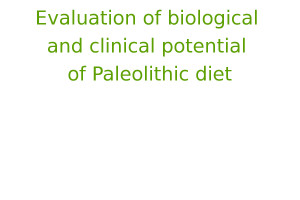Department of Dietetics, Faculty of Human Nutrition and Consumer Sciences,
Warsaw University of Life Sciences,
02-776 Warsaw, Nowoursynowska 159C Street
The results of research on "Evaluation of biological and clinical potential of Paleolithic diet" conducted by Ł. M. Kowalski, J. Bujko (Annals of the National Institute of Hygien 2012, 63(1): 9-15.).
Accumulating evidences suggest that food that were regularly consumed during the human primates and evolution, in particular during the Paleolithic era (2.6 – 0.01 x 10 6 years ago), may be optimal for the prevention and treatment of some chronic diseases.
It has been postulated that fundamental changes in the diet and other lifestyle conditions that occurred after the Neolithic Revolution, and more recently with the beginning of the Industrial Revolution are too recent taking into account the evolutionary time scale for the human genome to have completely adjust. In contemporary Western populations at least 70% of daily energy intake is provided by foods that were rarely or never consumed by Paleolithic hunter-gatherers, including grains, dairy products as well as refined sugars and highly processed fats. Additionally, compared to Western diets, Paleolithic diets, based on recently published estimates of macronutrient and fatty acid intakes from an East African Paleolithic diet, contained more proteins and long-chain polyunsaturated fatty acids, and less linoleic acid.
Observational studies of hunter-gatherers and other non-western populations lend support to the notion that a Paleolithic type diet may reduce the risk of cardiovascular disease, metabolic syndrome, type 2 diabetes, cancer, acne vulgaris and myopia. Moreover, preliminary intervention studies using contemporary diet based on Paleolithic food groups (meat, fish, shell – fish, fresh fruits and vegetables, roots, tubers, eggs, and nuts), revealed promising results including favorable changes in risk factors, such as weight, waist circumference, C-reactive protein, glycated haemoglobin (HbA1c), blood pressure, glucose tolerance, insulin secretion, insulin sensitivity and lipid profiles. Low calcium intake, which is often considered as a potential disadvantage of the Paleolithic diet model, should be weighed against the low content of phytates and the low content of sodium chloride, as well as the high amount of net base yielding vegetables and fruits.
Increasing number of evidences supports the view that intake of high glycemic foods and insulinotropic dairy products is involved in the pathogenesis and progression of acne vulgaris in Western countries. In this context, diets that mimic the nutritional characteristics of diets found in hunter-gatherers and other non-western populations may have therapeutic value in treating acne vulgaris. Additionally, more studies is needed to determine the impact of gliadin, specific lectins and saponins on intestinal permeability and the pathogenesis of autoimmune diseases.
The complete study "Evaluation of biological and clinical potential of Paleolithic diet" (Ł. M. Kowalski, J. Bujko) in pdf file format:
The original text taken from a:
Annals of the National Institute of Hygien 2012, 63(1): 9-15.
Available under conditions of the license:![]() http://creativecommons.org/licenses/by-nc/3.0/
http://creativecommons.org/licenses/by-nc/3.0/
Translations
| The article "Evaluation of biological and clinical potential of Paleolithic diet" in other languages | |
|---|---|
| Ocena potencjału biologicznego i klinicznego diety paleolitycznej (Ł. M. Kowalski, J. Bujko) po Polsku: Ocena potencjału biologicznego i klinicznego diety paleolitycznej Department of Dietetics, Faculty of Human Nutrition and Consumer Sciences, Warsaw University of Life Sciences, 02-776 Warsaw, Nowoursynowska 159C Street |  |












